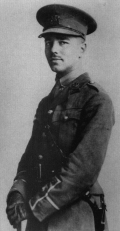Wilfred Owen (1893–1918)
- Biography
- Analysis of 'Disabled'
- More Poems & Letters by Owen
Biography
Owen was born on 18th March 1893 in Oswestry, Shropshire, son of Tom and Susan Owen. After the death of his grandfather in 1897 the family moved to Birkenhead (Merseyside).
His education began at the Birkenhead Institute, and then continued at the Technical School in Shrewsbury when the family were forced to move there in 1906-7 when his father was appointed Assistant Superintendent of the London and North Western and Great Western Joint Railways. Already displaying a keen interest in the arts, Owen's earliest experiments in poetry began at the age of 17. After failing to attain entrance to the University of London, he spent a year as a lay assistant to the Revd. Herbert Wigan at Dunsden before leaving for Bordeaux, France, to teach at the Berlitz School of English.
During the latter part of 1914 and early 1915 Owen became increasingly aware of the magnitude of the War and he returned to England in September 1915 to enlist in the Artists' Rifles a month later. He received his commission to the Manchester Regiment (5th Battalion) in June 1916, and spent the rest of the year training in England.
1917 in many ways was the pivotal year in his life, although it was to prove to be his penultimate. In January he was posted to France and saw his first action in which he and his men were forced to hold a flooded dug-out in no-man's land for fifty hours whilst under heavy bombardment. In March he was injured with concussion but returned to the front-line in April. In May he was caught in a shell-explosion and when his battalion was eventually relieved he was diagnosed as having shell-shock ('neurasthenia'). He was evacuated to England and on June 26th he arrived at Craiglockhart War Hospital near Edinburgh.
Had Owen not arrived at the hospital at that time one wonders what might have happened to his literary career, for it was here that he met Siegfried Sassoon who was also a patient. Sassoon already had a reputation as a poet and after an awkward introduction he agreed to look over Owen's poems. As well as encouraging Owen to continue, he introduced him to such literary figures as Robert Graves (a friend of Sassoon's) which in turn, after his release from hospital, allowed Owen to mix with such luminaries as Arnold Bennett and H. G. Wells.
The period in Craiglockhart, and the early part of 1918, was in many ways his most creative, and he wrote many of the poems for which he is remembered today. In June 1918 he rejoined his regiment at Scarborough and then in August he returned to France. He was awarded the Military Cross for bravery at Amiens, but was killed on the 4th November whilst attempting to lead his men across the Sambre canal at Ors. The news of his death reached his parents on November 11th 1918, the day of the armistice.
Biography by: Dr. Stuart Lee, 1997
Disabled
He sat in a wheeled chair, waiting for dark,
And shivered in his ghastly suit of grey,
Legless, sewn short at elbow. Through the park
Voices of boys rang saddening like a hymn,
Voices of play and pleasure after day, (5)
Till gathering sleep had mothered them from him.About this time Town used to swing so gay
When glow-lamps budded in the light blue trees,
And girls glanced lovelier as the air grew dim, -
In the old times, before he threw away his knees. (10)
Now he will never feel again how slim
Girls' waists are, or how warm their subtle hands.
All of them touch him like some queer disease.There was an artist silly for his face,
For it was younger than his youth, last year. (15)
Now, he is old; his back will never brace;
He's lost his colour very far from here,
Poured it down shell-holes till the veins ran dry,
And half his lifetime lapsed in the hot race
And leap of purple spurted from his thigh. (20)One time he liked a blood- smear down his leg,
After the matches, carried shoulder-high.
It was after football, when he'd drunk a peg,
He thought he'd better join. - He wonders why.
Someone had said he'd look a god in kilts, (25)
That's why; and maybe, too, to please his Meg,
Aye, that was it, to please the giddy jilts
He asked to join. He didn't have to beg;
Smiling they wrote his lie: aged nineteen years.Germans he scarcely thought of; all their guilt, (30)
And Austria's, did not move him. And no fears
Of Fear came yet. He thought of jewelled hilts
For daggers in plaid socks; of smart salutes;
And care of arms; and leave; and pay arrears;
Esprit de corps; and hints for young recruits. (35)
And soon, he was drafted out with drums and cheers.Some cheered him home, but not as crowds cheer Goal.
Only a solemn man who brought him fruits
Thanked him; and then enquired about his soul.Now, he will spend a few sick years in institutes, (40)
And do what things the rules consider wise,
And take whatever pity they may dole.
Tonight he noticed how the women's eyes
Passed from him to the strong men that were whole.
How cold and late it is! Why don't they come (45)
And put him into bed? Why don't they come?
CPF, Vol. I, pp. 175-6
Literary Criticism of 'Disabled'
-
Disabled (title)
Owen remarks in a letter to Sally Owen (14th October 1917) that he showed this poem to Robert Graves who had come to Craiglockhart to visit Sassoon. Owen was struck by the fact that Graves was very impressed by the piece.In mid-1918 Owen drafted his famous Preface to a proposed collection of poems (never published in his lifetime) which apparently he intended to call 'Disabled and Other Poems' (thus emphasising the importance of the piece in his eyes). Fussell (1977) notes that the poem strongly echoes Housman's poem 'To an Athlete Dying Young', whose patriotic enthusiasm for war is strongly attacked by Owen:
…a poem in which Housman has also made certain that we see and admire the boy's eyes, ears, foot, head, and curls. Owen's former athlete, both legs and one arm gone, sits in his wheelchair in a hospital convalescent park listening to the shouts of "boys" playing at sunset. He can't help recalling the excitement of former early evenings in town before the war, back then "before he threw away his knees".
GWMM, P. 292
-
'He sat in a wheeled chair, waiting for dark' (L.1)
The immediate appearance of 'dark', 'grey' , and 'shivered' sets up the isolation of the wounded soldier. It strikes a strong comparison to the warmth of the second stanza. -
'used to swing so gay' (L.7)
The next few lines mirror the elegiac tone of such poems as 'The Ruin', an Old English poem, in which the poet (anonymous) looks on a ruined building, now frost-bitten and decrepit, imagining the sound and warmth that once rang through its walls. -
'glow-lamps' and 'girls glanced' (L.8 & L9)
Both are linked effectively by the use of alliteration. -
'before he threw away his knees' (L.10)
The implication that this was a needless loss (sacrifice) is reinforced by Ll.23-4 where the wounded soldier fails to remember why he joined up, pointing only to a distant sense of duty, and euphoria after the football match. Fussell notes that:Owen's favourite sensuous device is the formula 'his - ', with the blank usually filled with a part of the body.
(p. 292). -
'Now he will never feel again how slim/Girls' waists are' (L.11 & L.12)
Showing not only the physical loss of his arm, but also the psychological scars as the soldier knows he will be shunned by women from now on. -
'younger than his youth' (L.15)
The reversal is total. The implication is that his face is now older than his youth. -
'He's lost his colour very far from here' (L.17)
C. Day Lewis cites this line as an example of one of the great memorable lines written by Owen. It is an example ofdeliberate, intense understatements - the brave man's only answer to a hell which no epic words could express...more poignant and more rich with poetic promise than anything else that has been done during this century.
HFP, P.17 -
'spurted from his thigh' (L.20)
Clearly a parody of sexual ejaculation. Owen uses erotic language at this point but referring to blood instead of semen. The irony being that here we have the loss of life (the soldier loses his limbs, and his senses) as opposed to the creation of life. The sexual imagery plays on the continual point that his injuries, resulting from his enlisting in order to please his girlfriend and other admirers (ll. 25-6), has resulted in him being abhorrent to women. -
' a bloodsmear down his leg,/After the matches, carried shoulder-high' (L.21 & L.22)
Again Owen uses irony effectively here. We are already aware that the soldier has lost an arm and his legs, yet here we are told that before the War he felt proud to have an injury (albeit obtained on the football field), and to be carried shoulder-high (for reasons of celebration as opposed to helplessness). The concept of reversal is again used: sporting hero to cripple, handsome to 'queer disease' (L.13), colour to dark, warmth to cold. -
'a god in kilts' (L.25)
An indication that the soldier was a member of one of the Scottish regiments (repeated in ll.32-6). This also implies that the soldier joined up for reasons of vanity. -
'giddy jilts' (L.27)
A Scottish term for a young woman. -
'Smiling they wrote his lie: aged nineteen years' (L.29)
The sadness of the soldier's plight is heightened. Clearly he was under-aged when he enlisted and therefore is still young. -
'Some cheered him home, but not as crowds cheer Goal' (L.37)
Recalls the image of the football match earlier. L.22 implies that he was carried from the field shoulder-high, possibly as the result of scoring the winning goal. Here, despite having achieved far more, for far greater a loss than a 'blood- smeared leg', the crowd's reception is more hollow. -
'do what things the rules consider wise' (L.41)
The soldier's passivity is complete. The fine young athlete has been reduced to a state of dependency on others and helplessness (heightened by the pitiful closing repetition of 'Why don't they come?'). The stanza has him waiting for others to do things for him, he 'spends a few sick years', 'takes whatever pity' others choose to offer him; he is passed over by the women's attentions, as he bemoans the cold and hopes that someone will put him to bed. -
'Tonight he noticed how the women's eyes/Passed from him to the strong men that were whole' (L.43 & L.44)
Repeating again the loss of the soldier, this time in his attractiveness to the opposite sex. 'Whole' implying that he is incomplete, less than a man.Ironically he is now dependent on young women to put him to bed, in contrast with his prewar virile manhood when he could expect to take women to bed
. SPP, P.215 -
'...Why don't they come' (L.45 & L.46)
Dominic Hibberd has noted that this line can be linked to the recuiting poster of 1914, 'Will they never come?' (see 'Some Contemporary Allusions in Poems by Rosenberg, Owen and Sassoon', Notes and Queries August (1979), p.333. Several recruiting posters used the motif of linking sport to the army, and there were numerous recruiting drives at soccer matches.



